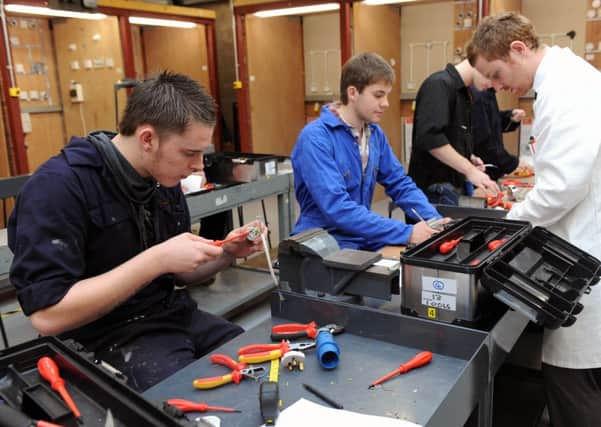Stephanie Flanders: Don’t let young miss recovery


We seem to almost take pleasure in the badness of our bad news – and when things look up, we jump to question the figures. But after years of gloomy headlines, the news from the economy really is getting better, and the news on jobs is especially encouraging.
The latest figures show the number of people in work across the UK growing at the fastest rate in 25 years – with jobs growth in Scotland even slightly faster than that average. The share of the working age population in employment is very close to a record high.
Advertisement
Hide AdAdvertisement
Hide AdHow the UK has created nearly a million extra jobs since 2010 without generating very much more economic output is one of the big puzzles that I grappled with in my years reporting on the economy for the BBC. But for the under-25s there has not been a mystery to solve: youth unemployment rose very early when the recession came in 2008 and it has been slow to fall.
Scotland’s 18.3 per cent unemployment rate among 18 to 24-year-olds is nearly three times the rate of joblessness for the broader population and somewhat higher than the UK average. We are now seeing youth unemployment come down too, but there is still plenty of reason to worry, given what we know about the long-term costs – personal and financial – of spending the early years of one’s career out of work.
That is why I was so glad to join Scotland’s business and finance leaders at The Prince’s Trust’s annual Financial Lunch in Edinburgh on Friday, an event which demonstrated the private sector’s commitment to supporting young people. But the potential for businesses to help themselves and the broader economy by tackling youth unemployment goes far beyond raising valuable funds.
Across Scotland there are already more than 100 companies working with The Prince’s Trust to create and support programmes that equip young people with the skills, knowledge and experience that employers look for – and often complain they cannot find. In 2013 alone, I was impressed to learn that this collaborative approach had enabled the Trust to support 8,000 young people in Scotland – 75 per cent of whom went on to find a job, get back into education or start a business.
As the Commission for Developing Scotland’s Young Workforce highlighted, youth unemployment is too big a challenge to be tackled by any one group. Its call for employers and industry to join forces with schools and colleges makes a lot of sense.
But we have known these things for a long time. The trick will be actually making it happen – in time to give a fresh start to young people who have already waited too long. As a wise man once said, vision without implementation is hallucination.
Confidence is so important to business and the broader economy. If we expect to be disappointed, those low expectations can all too easily become a self-fulfilling prophesy.
At the risk of sounding like my grandmother, the same is surely true of young people who have not had a chance to show their worth. If we decide they haven’t got much to contribute to this recovery, we shouldn’t be surprised if they do too.
Advertisement
Hide AdAdvertisement
Hide AdWe will all be the poorer for that mistake, in a world where everyone is sure that skills will be central to the country’s long-term prosperity and no-one is very confident that we have enough.
Some things look different on this side of the Border. But the lesson I drew from Friday’s conversations was that the challenge of making sure everyone plays a part in this recovery does not look very different at all.
Britain’s national income is now more than 15 per cent smaller than it would have been had we managed to simply grow at our long-term average rate since 2007, instead of falling off a financial cliff. No-one knows how much of that lost wealth – lost output – is gone for good. But helping more young people realise their potential would be an excellent start. «
• Stephanie Flanders is chief market strategist for JP Morgan Asset Management in the UK and Europe. The Prince’s Trust: princes-trust.org.uk